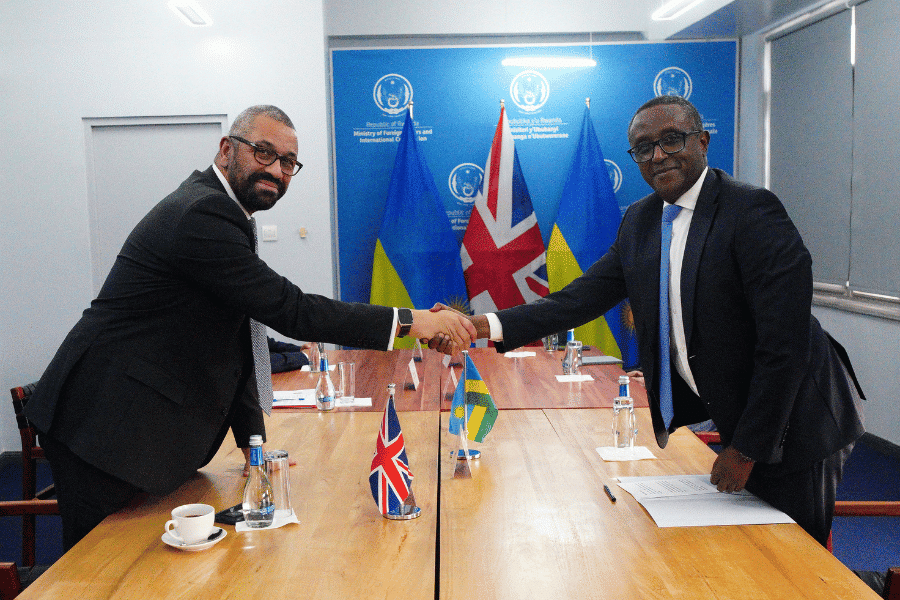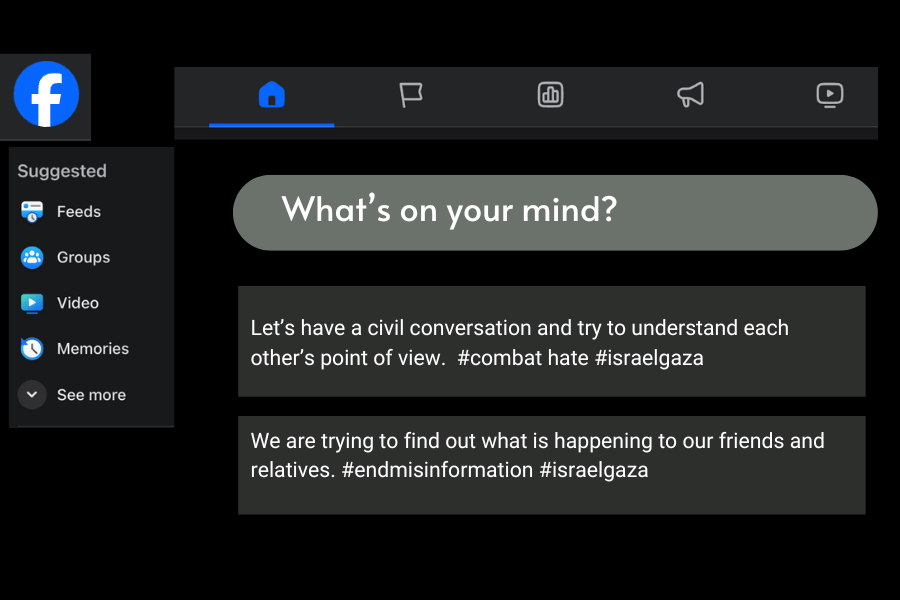
by Jeremy Solomons | 22 Jan 2024 | Africa, Human Rights, Politics
Britain wants to send migrants to Rwanda. The British court says that’s not safe. For our correspondent Rwanda is home — and a place people come to for safety. Home Secretary James Cleverly and Rwandan Minister of Foreign Affairs Vincent Biruta shake hands at a...

by Ella Gorodetzky | 18 Jan 2024 | Educators' Catalog, Human Rights, Israel-Palestine, Media Literacy, Middle East, University of Wisconsin, Youth Voices
From Gaza to Israel to the United States some people are turning to social media for civil discussion. Can we stop disinformation about the Middle East? Posts on an imaginary social media page calling for civil dialogue about the Middle East. (Illustration by News...
Social media can be a double-edged sword — with the power to unite and to divide. How can students differentiate between disinformation and credible content? Journalism undergraduate student Ella Gorodetsky from the University of Wisconsin-Madison looks at social media posts about the Israel-Hamas war to investigate.
Exercise: After reading the article together, have students come up with a social media campaign to stop the spread of disinformation. In 160 characters or less, students should invent a catchy slogan to help others distinguish between credible and fake content. This activity should be done in groups of 2-3.

by Joseph Katusabe | 17 Jan 2024 | Africa, African Leadership Academy, Catholicism, Decoder Replay, Human Rights, Religion, Student Posts, Youth Voices
One parishioner argues that the Church should welcome gay members. The Pope is just now cracking open the door by offering a small blessing. Vatican City with an LGBT flag superimposed to seem waving in welcome. Photo illustration by News Decoder. Editor’s note:...

by Alan Wheatley | 15 Jan 2024 | China, Decoders, Economy
It is the top trading partner for 120 countries. So if China’s economy tanks so will the world. But fears that that will happen may be overblown. A worker checks the growth of mushroom at a modern agricultural company in Laixi city in east China’s Shandong...

by Andrea Knezevic | 8 Jan 2024 | Educators' Catalog, Europe, Journalism, WePod
Ljudmila Janković is a journalist in the Balkans, where speech isn’t quite free. But podcasting there might help foster a more independent media. Ljudmila Janković. (Photo courtesy Press Freedom Foundation) In the Western Balkans, journalists operate within a...
A free press is a central component of a democratic society. But press freedom worldwide is far from guaranteed. In this article, News Decoder Communications Specialist Andrea Knezevic interviews Ljudmila Janković of Press Freedom Foundation Serbia to uncover the challenges journalists face in the Balkans.
Exercise: As students dive into the world of journalism, help them explore the many ways to tell stories — audio, visual, text. After reading the article, students should listen to the text’s accompanying podcast episode. What are the nuances of audio versus text storytelling? Which types of stories lend themselves to audio best? You may consider following up with a podcast interviewing assignment for students.

by Enock Wanderema | 5 Jan 2024 | Africa, Religion
The fusion lifestyle of a modern tribal African. Sunset over Kampala, Uganda. (Credit: Goodman Kazoora/Getty Images) This article was produced exclusively for News Decoder’s global news service. It is through articles like this that News Decoder strives to provide...

by Thomas Hickey | 4 Jan 2024 | Middle East, Politics, Syria, University of Wisconsin, Women, Youth Voices
The Kurdish people in North Syria are attacked by Turkey to the north and Syria to the south. No one wants them there but they have nowhere to go. People attend the funeral of four Kurds in the town of Jinderis, Syria, 21 March 2023. The assailants shot the Kurdish...

by Helen Womack | 3 Jan 2024 | Decoder Replay, Europe
Millions of people around the world have no rights and live in the shadows, on the margins of society. Migrants are rescued by a Doctors Without Borders rescue team boat in the Mediterranean Sea after leaving Libya trying to reach European soil, 6 October 2023. (AP...

by News Decoder | 29 Dec 2023 | Media Literacy, World
Garbage in Paris. Death of a statesman. Climate talks in the desert. Coups and crises. As we greet 2024, how much do you recall from the year that’s been? 2023 Current Events Quiz News Decoder correspondents help us understand what happens across the globe....

by Harvey Morris | 28 Dec 2023 | Israel-Palestine, Middle East, Politics
Despite the failure to achieve even substantial cease fires in Israel’s war with Hamas, there are people who still think lasting peace is possible. Workers place sections of a nine-meter (30-foot) high concrete wall to replace a border fence between the northern...










